Meet the Fellows
Gabriella Andreotti
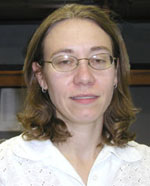 Gabriella received her Ph.D. in Epidemiology, from George Washington University (GWU). Her dissertation was titled “The risk of biliary tract cancers and biliary stones in relation to serum lipid levels and variants of genes in the lipid metabolism pathway.”
Gabriella received her Ph.D. in Epidemiology, from George Washington University (GWU). Her dissertation was titled “The risk of biliary tract cancers and biliary stones in relation to serum lipid levels and variants of genes in the lipid metabolism pathway.”
Gabriella has been with NCI before arriving at OEEB. She received a Cancer Research Training Award (CRTA) as a pre-doctoral fellow with the Hormonal and Reproductive Epidemiology Branch (HREB). Now as a post-doctoral fellow she received another fellowship award (CRTA) with OEEB.
Committee service is a part of Gabriella’s professional career, including the Biliary Tract Cancer-Single Nucleotide Polymorphisms Working Group and the Fellows’ Colloquium, as an organizer of presentations. Both committees are at NCI.
She has presented at the American Association for Cancer Research (AACR) and Society for Epidemiologic Research(SER) and was invited to speak at GWU on the subject of biliary tract cancer and biliary stones in relation to serum lipid levels and polymorphisms of genes in the lipid metabolism pathway. Her peer-reviewed articles have been published in the International Journal of Cancer.
Laura Beane-Freeman
 The carcinogenicity of formaldehyde exposure is the focus of one area of Laura's research. She is Principal Investigator of a cohort of industrial workers in formaldehyde industries and co-investigator on several other studies examining the potential carcinogenicity of formaldehyde.
The carcinogenicity of formaldehyde exposure is the focus of one area of Laura's research. She is Principal Investigator of a cohort of industrial workers in formaldehyde industries and co-investigator on several other studies examining the potential carcinogenicity of formaldehyde.
Recently, she became the NCI co-principal investigator of the Agricultural Health Study. Along with Dr. Aaron Blair, she is co-organizer of the International Agricultural Cohort Consortium Meeting.
In addition, Laura is a co-investigator on the New England Bladder Cancer Study, where she is leading the effort to conduct retrospective exposure assessment for a variety of contaminants from public drinking water sources, including arsenic and disinfection by-products.
She has received the Fellows’ Award for Research Excellence from the National Institutes of Health (NIH) and is a founding member of the DCEG Fellows’ Colloquium Organizing Committee and a member of the NCI’s Outstanding Mentor Award Review Committee.
Sonja Berndt
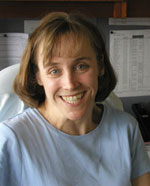 Sonja Berndt is currently a Research Fellow in the Occupational and Environmental Epidemiology Branch (OEEB). After receiving an A.B. from Dartmouth College, Dr. Berndt received a Doctor of Pharmacy (Pharm.D.) from the University of Michigan and completed a one-year pharmacy practice residency at the University of Michigan Medical Center. Dr. Berndt joined OEEB in 2003 and finished her Ph.D. in epidemiology from Johns Hopkins Bloomberg School of Public Health in 2006.
Sonja Berndt is currently a Research Fellow in the Occupational and Environmental Epidemiology Branch (OEEB). After receiving an A.B. from Dartmouth College, Dr. Berndt received a Doctor of Pharmacy (Pharm.D.) from the University of Michigan and completed a one-year pharmacy practice residency at the University of Michigan Medical Center. Dr. Berndt joined OEEB in 2003 and finished her Ph.D. in epidemiology from Johns Hopkins Bloomberg School of Public Health in 2006.
Dr. Berndt’s primary research interests are in discovering genetic risk factors for cancer. Under the mentorship of Dr. Richard Hayes, Dr. Berndt has explored the association between genetic variants in several pathways (e.g., DNA repair, hormone metabolism) and the risk of colorectal neoplasia and prostate cancer within the Prostate, Lung, Colorectal and Ovarian (PLCO) Cancer Screening Trial. In addition, she has collaborated on multiple genetic-based studies of non-Hodgkin lymphoma, multiple myeloma, and cancers of the breast, lung, and kidney. Dr. Berndt is currently involved in a large pooling project of genome-wide scans to examine genetic variants associated with anthropometric traits, such as obesity and height. Other research interests include analyzing claims-based data and exploring dietary risk factors for cancer.
Dr. Berndt is involved in several consortium efforts, including the Breast and Prostate Cancer Cohort Consortium (BPC3), the Genetic Investigation of Anthropometric Traits (GIANT) Consortium, and the International Lymphoma Epidemiology Consortium (InterLymph). She is also a member of the International Genetic Epidemiology Society, the Society for Epidemiologic Research, and the American Pharmaceutical Association. During her stay in OEEB, Dr. Berndt has received several awards, including an NCI Director’s Career Development Award, NCI Intramural Research Award, and NIH Fellows Award for Research Excellence (FARE).
Sarah Daugherty
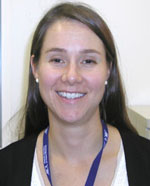 Sarah achieved her Ph.D. from Johns Hopkins University in Cancer Genetic Epidemiology. While there, she received the National Research Service Award and the Cancer Research Training Award (CRTA).
Sarah achieved her Ph.D. from Johns Hopkins University in Cancer Genetic Epidemiology. While there, she received the National Research Service Award and the Cancer Research Training Award (CRTA).
At the NIH’s National Human Genome Research Institute (NHGRI), she began her career as a graduate intern. Later changing institutes to NCI in DCEG, she started as a graduate student volunteer and progressed to a post-doctoral fellow. During the time between graduate student volunteer and post-doctoral fellow, Sarah was a visiting professor teaching fundamental principles of epidemiology in Introduction to Epidemiology at the University of Baltimore, School of Public Affairs.
She has published in many journals such as, Prostate, Cancer Research, Cancer Epidemiology Biomarkers and Prevention, and Annals of Human Genetics.
Her findings have been presented at the American Association for Cancer Research (AACR) and the Society for Epidemiologic Research.
Linda Dong
 Nutritional research has encompassed Linda’s professional life. Linda first experienced the merging of her interests in nutrition and physical activity with the field of epidemiology while at the University of California, Berkeley where she obtained her BS and MPH. Building on her background in nutrition, her Ph.D. dissertation at the University of Washington furthered her interests through evaluating the interplay between nutrition and genetics in relation to cancer risk: “Genetic variation in calcium and vitamin D related genes and colon cancer”. Other research she conducted while at the Fred Hutchinson Cancer Research Center included conducting a review of meta-analyses and pooled analyses of genetic polymorphisms and cancer risk, and investigating the association between dietary factors in a cohort of individuals with Barrett’s esophagus.
Nutritional research has encompassed Linda’s professional life. Linda first experienced the merging of her interests in nutrition and physical activity with the field of epidemiology while at the University of California, Berkeley where she obtained her BS and MPH. Building on her background in nutrition, her Ph.D. dissertation at the University of Washington furthered her interests through evaluating the interplay between nutrition and genetics in relation to cancer risk: “Genetic variation in calcium and vitamin D related genes and colon cancer”. Other research she conducted while at the Fred Hutchinson Cancer Research Center included conducting a review of meta-analyses and pooled analyses of genetic polymorphisms and cancer risk, and investigating the association between dietary factors in a cohort of individuals with Barrett’s esophagus.
Linda joined OEEB as a Sallie Rosen Kaplan post-doctoral fellow. The work she is doing here is with Wong-Ho Chow, Ph.D., and Lee Moore, Ph.D., evaluating both genetic and lifestyle risk factors from two large case-control studies of renal cancer conducted in the U.S. and Europe. In addition, she is involved in studies on upper gastrointestinal cancer (esophageal and gastric) within several consortiums. During her time in OEEB, Dr. Dong has received several awards, including a DCEG Molecular Epidemiology Research Award and an NIH Fellows Award for Research Excellence (FARE).
She has published in the Journal of the American Medical Association (JAMA), Lancet Oncology, International Journal of Behavioral Nutrition and Physical Activity, Nutrition and Cancer, and Cancer Epidemiology Biomarkers and Prevention. She performs peer-review services for the journal Nutrition and Cancer and the International Journal of Cancer. Linda has membership in professional organizations such as the American Association for Cancer Research and the Society for Epidemiologic Research.
Dean Hosgood
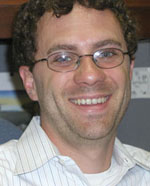 Currently, Dean is involved in research of cancer risks in Asian populations. His primary research interests pertain to inter-individual genetic susceptibility to environmental exposures, specifically non-smoking lung cancer and indoor air pollution from coal and wood combustion exposure in China. Under the primary mentorship of Dr. Qing Lan and Dr. Nathaniel Rothman in OEEB and Dr. Tongzhang Zheng and Dr. Yong Zhu at Yale University, Dean’s dissertation, entitled “Etiology of Lung Cancer and Environmental Risk Factors in Xuan Wei, China”, will expand on experimental and epidemiological evidence that suggests genetic susceptibility to lung cancer in populations with indoor fuel combustion exposures. Dean’s focus is on polycyclic aromatic hydrocarbon (PAH) metabolism and DNA repair genes, as well as polymorphisms in the apoptosis pathway. Beyond his dissertation, Dean is also investigating dietary risk factors and genetic susceptibility to multiple myeloma with Dr. Dalsu Baris in OEEB. An interest in the well-being of his fellow citizens is reflected in the involvement in health committees, such as, Environmental Policy Committee of the American Public Health Association (APHA) in Washington, DC and the DCEG Fellows Colloquia Planning Committee in Rockville, Maryland. He is also a member of The New York Academy of Sciences, and the American Association for Cancer Research (AACR) with an emphasis in their Molecular Epidemiology Group. His education, as well as, his work has focused in the sciences with an ever-increasing interest towards Cancer Epidemiology. He is in pursuit of a Ph.D. in Cancer Epidemiology from Yale University. Dean is originally from Pennsylvania, where he earned his B.S. in Chemistry from Carnegie Mellon University.
Currently, Dean is involved in research of cancer risks in Asian populations. His primary research interests pertain to inter-individual genetic susceptibility to environmental exposures, specifically non-smoking lung cancer and indoor air pollution from coal and wood combustion exposure in China. Under the primary mentorship of Dr. Qing Lan and Dr. Nathaniel Rothman in OEEB and Dr. Tongzhang Zheng and Dr. Yong Zhu at Yale University, Dean’s dissertation, entitled “Etiology of Lung Cancer and Environmental Risk Factors in Xuan Wei, China”, will expand on experimental and epidemiological evidence that suggests genetic susceptibility to lung cancer in populations with indoor fuel combustion exposures. Dean’s focus is on polycyclic aromatic hydrocarbon (PAH) metabolism and DNA repair genes, as well as polymorphisms in the apoptosis pathway. Beyond his dissertation, Dean is also investigating dietary risk factors and genetic susceptibility to multiple myeloma with Dr. Dalsu Baris in OEEB. An interest in the well-being of his fellow citizens is reflected in the involvement in health committees, such as, Environmental Policy Committee of the American Public Health Association (APHA) in Washington, DC and the DCEG Fellows Colloquia Planning Committee in Rockville, Maryland. He is also a member of The New York Academy of Sciences, and the American Association for Cancer Research (AACR) with an emphasis in their Molecular Epidemiology Group. His education, as well as, his work has focused in the sciences with an ever-increasing interest towards Cancer Epidemiology. He is in pursuit of a Ph.D. in Cancer Epidemiology from Yale University. Dean is originally from Pennsylvania, where he earned his B.S. in Chemistry from Carnegie Mellon University.
An-Tsun Huang
 An-Tsun received her Ph.D., from the University of Michigan at Ann Arbor. Her dissertation expounded on the formation, fate, and risk of disinfection by-products in foods and beverages.
An-Tsun received her Ph.D., from the University of Michigan at Ann Arbor. Her dissertation expounded on the formation, fate, and risk of disinfection by-products in foods and beverages.
She is applying her interest in exposure assessment and risk analysis by helping to develop an exposure algorithm for arsenic in drinking water for the New England Bladder Cancer Study, analyzing the influence and risk of reproductive factors for bladder cancer in women in the Spanish Bladder Cancer Study, developing a job exposure matrix for silica exposure in Shanghai industries in the Shanghai Women’s Cohort Study, and collecting information on genetic polymorphisms involved in metabolism of disinfection by-products in a gene-environmental interaction study. Her efforts are culminating into several articles in preparation for submission or have already been submitted to journals.
An-Tsun has presented to the International Society of Exposure Analysis, the Society for Risk Analysis, and the Society for Epidemiology Research on the subjects of exposure assessment and risk analysis. Also, she is a member of two professional societies; the Society for Risk Analysis and the International Society of Environmental Epidemiology.
Sara Karami
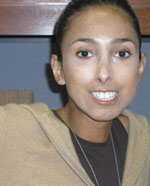 Sara's earlier experiences with hematology culminated into her present research and statistical analysis into age-related cancer disparities. Her interest in age-related cancer disparities also earned her the Epidemiology & Biostatistics Special Project Award, presented to her by GWU in 2004. At present, Sara is pursuing her Ph.D. in Epidemiology at George Washington University (GWU). Her Master’s in Epidemiology and Biostatistics was achieved also at GWU but her Bachelor’s at James Madison University in Biology and Pre-Med. Sara is originally from Iran.
Sara's earlier experiences with hematology culminated into her present research and statistical analysis into age-related cancer disparities. Her interest in age-related cancer disparities also earned her the Epidemiology & Biostatistics Special Project Award, presented to her by GWU in 2004. At present, Sara is pursuing her Ph.D. in Epidemiology at George Washington University (GWU). Her Master’s in Epidemiology and Biostatistics was achieved also at GWU but her Bachelor’s at James Madison University in Biology and Pre-Med. Sara is originally from Iran.
Briseis Kilfoy
Briseis is a Pre-Doctoral Training Fellow participating in the NCI-Yale University partnership. She is completing her dissertation work on thyroid cancer at the NCI. Ms. Kilfoy is currently working with Dr. Mary Ward on the relation of drinking water and dietary nitrate exposure to thyroid cancer and other thyroid abnormalities and conducting descriptive analyses of thyroid cancer with Dr. Bill Anderson and Dr. Susan Devesa in the Biostatistics Branch. Before coming to the NCI, her work at Yale included projects on genetic factors and NHL risk, family history and breast cancer, and tobacco control interventions. Briseis completed her Masters in Public Health at Yale University and her bachelors degree at the University of Chicago. Briseis is originally from Madison, Wisconsin.
She has been published in peer-reviewed publications, such as, Cancer Epidemiology Biomarkers Prevention, 2007, Preventing Chronic Disease, 2007, the American Journal Epidemiology, 2007, and the Journal of American Pharmacology Association, 2006.
Stella Koutros
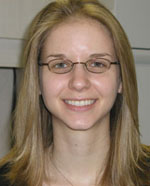
Stella's current work includes research on occupational and dietary risk factors for prostate cancer, non-Hodgkin’s lymphoma, and bladder cancer. With her mentor Dr. Michael Alavanja, she is also working on the Agricultural Health Study, http://www.aghealth.org/. She herself is a mentor to a Master’s level student on the same study. She completed her PhD in Public Health from Yale University.
Stella began her education with a Bachelor in Anthropology from Tufts University with a focus on epidemiology and public health. Her experiences before coming to NCI have been in various aspects of the public health field including two Yale/NCI grants for Epidemiology training and working at the Connecticut Tumor Registry focusing on cancer epidemiology. In 2008, she was awarded the American College of Epidemiology (ACE), Student Prize for her work on "Aromatic amine pesticide use and human cancer risk: results from the U.S. Agricultural Health Study". She is originally from Brooklyn, New York.
Kyoung-Mu Lee
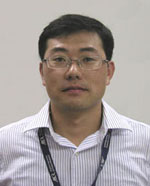 Kyoung-Mu attained his Ph.D. at the Seoul National University with a thesis in a case-control study of childhood cancer in Korea. He was a researcher at the Institute of Environmental Medicine, Seoul National University before coming to NIH/NCI as a post-doctoral visiting fellow. He has participated in the studies on the topics of gene-environmental interactions for breast, lung, and childhood leukemia. His doctoral thesis was about the interactive effect between paternal smoking and CYP1A1 polymorphism on the development of childhood leukemia. His findings have been published in Cancer Epidemiology, Biomarkers and prevention, Clinical Cancer research, Breast Cancer Research and Treatment, Carcinogenesis, and the others.
Kyoung-Mu attained his Ph.D. at the Seoul National University with a thesis in a case-control study of childhood cancer in Korea. He was a researcher at the Institute of Environmental Medicine, Seoul National University before coming to NIH/NCI as a post-doctoral visiting fellow. He has participated in the studies on the topics of gene-environmental interactions for breast, lung, and childhood leukemia. His doctoral thesis was about the interactive effect between paternal smoking and CYP1A1 polymorphism on the development of childhood leukemia. His findings have been published in Cancer Epidemiology, Biomarkers and prevention, Clinical Cancer research, Breast Cancer Research and Treatment, Carcinogenesis, and the others.
His current research activities at OEEB include Xuanwei Lung Cancer Case-control study, New South Wales NHL study, Prostate, Lung, Colorectal and Ovarian (PLCO) Cancer Screening Trial, Xuanwei Lung Cancer Cohort study, and Korean Childhood Cancer study. He is a member of the AACR, American Public Health Association, Korean Society of Environmental Health, and the Korean Society of Preventive Medicine.
Anjoeka Pronk
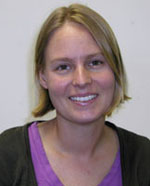 Anjoeka came to OEEB as a Visiting Postdoctoral Fellow. Her time will be spent working on occupational exposure and lung cancer risk in the Shanghai Women’s Health Study. And for the New England Cancer Study, she will use job modules to perform assessments of diesel exposure.
Anjoeka came to OEEB as a Visiting Postdoctoral Fellow. Her time will be spent working on occupational exposure and lung cancer risk in the Shanghai Women’s Health Study. And for the New England Cancer Study, she will use job modules to perform assessments of diesel exposure.
Anjoeka achieved her Ph.D. at the Institute for Risk Assessment Sciences, Utrecht University, The Netherlands. The field of study, which encompassed her thesis, was studying the association between isocyanate exposure and respiratory health effects in the spray painting industry. She setup an epidemiological study to evaluate isocyanate exposure and its risk on respiratory health. This project was partly carried out at the Department of Food and Chemical Risk Assessment, TNO, The Netherlands, where she was also involved in other projects.
She has published her works in the American Journal of Respiratory Critical Care Medicine, Occupational and Environmental Medicine, Annals of Occupational Hygiene, Zbi Arbeitsmed, and Allergy. Anjoeka was invited to present the results of her thesis at Yale University. At various conferences, she has also presented the findings of her work. These conferences were the 19th International Conference on Epidemiology in Occupational Health, the American Thoracic Society International Conference, the XXVI European Academy of Allergology and Clinical Immunology Congress, and the International Occupational Hygiene Association.
She is originally from The Netherlands.
Mark Purdue
 Dr. Purdue received his Ph.D. in Epidemiology at the University of Toronto. He arrived at DCEG as a visiting fellow and later became a Research Fellow. During his time at DCEG, Dr. Purdue received a NCI/DCEG Fellowship Achievement Award, a NCI/DCEG Intramural Research Award and a NIH Fellows Award for Research Excellence.
Dr. Purdue received his Ph.D. in Epidemiology at the University of Toronto. He arrived at DCEG as a visiting fellow and later became a Research Fellow. During his time at DCEG, Dr. Purdue received a NCI/DCEG Fellowship Achievement Award, a NCI/DCEG Intramural Research Award and a NIH Fellows Award for Research Excellence.
Dr. Purdue’s research focuses on clarifying the importance of occupational, environmental and genetic factors in the etiology of non-Hodgkin lymphoma (NHL), testicular germ cell tumors and other cancers. A particular interest of his is in applying molecular biology techniques to epidemiologic studies to obtain further insight into the pathogenetic mechanisms underlying cancer induction.
Min Shen
 Min holds an M.D. and several years later was granted a Ph.D. in Chronic Disease Epidemiology. As a teacher at Tongji Medical College, Wuhan, China, he taught epidemiology and mentored students.
Min holds an M.D. and several years later was granted a Ph.D. in Chronic Disease Epidemiology. As a teacher at Tongji Medical College, Wuhan, China, he taught epidemiology and mentored students.
He was a Postdoctoral Fellow at the International Agency for Research (IACR) before coming to OEEB as a Post-Doctoral Fellow, later he became a Research Fellow. Min belongs to the American Association for Cancer Research (AACR) and later refined his interest in the AACR by becoming a member of their Molecular Epidemiology Group.
At present, he is working on a biomarker study of workers exposed to trichloroethylene in China, genetic susceptibility component of the benzene poisoning case-cohort study in the China benzene cohort, genetic susceptibility to non-Hodgkin lymphoma (NHL) in the New South Wales, Australia study, and the pilot study for a multi-center hospital-based case-control study of lymphoid neoplasms in Asia.
He reviews and publishes in many professional journals.
Dana Van Bemmel
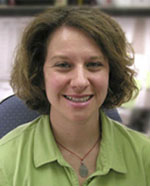 Dana received a doctoral degree in biochemistry and molecular biology from the University of Nebraska Medical Center, where she focused on understanding the mechanism of epigenetic gene regulation. She examined the cancer risk of pesticide applicators that are enrolled in the Agricultural Health Study while pursuing her master’s degree in public health from the Johns Hopkins Bloomberg School of Public Health.
Dana received a doctoral degree in biochemistry and molecular biology from the University of Nebraska Medical Center, where she focused on understanding the mechanism of epigenetic gene regulation. She examined the cancer risk of pesticide applicators that are enrolled in the Agricultural Health Study while pursuing her master’s degree in public health from the Johns Hopkins Bloomberg School of Public Health.
As a Cancer Prevention Fellow, Dana is working with Lee Moore, Ph.D., to carry out molecular epidemiologic studies of renal and bladder cancer. Her efforts have culminated in several published articles in the International Journal of Cancer, the Annals of the New York Academy of Sciences, and Protein Expression and Purification. She pursues her interests and keeps abreast of developments by attending American Association for Cancer Research meetings and the Cancer Prevention Fellow’s Scientific Symposium.
Jocelyn Weiss
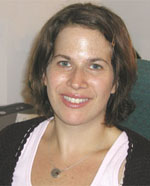 Jocelyn received her Ph.D. in Epidemiology at the University of Washington and her M.P.H. at Tufts University. At present, she is a Postdoctoral Fellow in DCEG/OEEB. For work presented at the 2007 American Association for Cancer Research (AACR) Annual Meeting, she received an AACR-AstraZeneca Scholar-in-Training Award.
Jocelyn received her Ph.D. in Epidemiology at the University of Washington and her M.P.H. at Tufts University. At present, she is a Postdoctoral Fellow in DCEG/OEEB. For work presented at the 2007 American Association for Cancer Research (AACR) Annual Meeting, she received an AACR-AstraZeneca Scholar-in-Training Award.
Her current efforts are turned towards the Prostate, Lung, Colorectal, and Ovarian (PLCO) Cancer Screening Trial and the Shanghai Women’s Health Study, with a research focus on hormonal and obesity-related risk factors for disease.
She has served as a reviewer for and has published in many professional journals including American Journal of Epidemiology, International Journal of Cancer, Gynecologic Oncology, Molecular Carcinogenesis, and Pain Medicine.
She is involved with the DCEG Technical Evaluation of Protocols (TEP) Committee, NIH Fellows Committee (FELCOM), and Co-Chairs the Mentoring Sub-Committee of NIH FELCOM. She is also a member of several professional societies including the AACR, the American Public Health Association, and the Society for Epidemiologic Research.